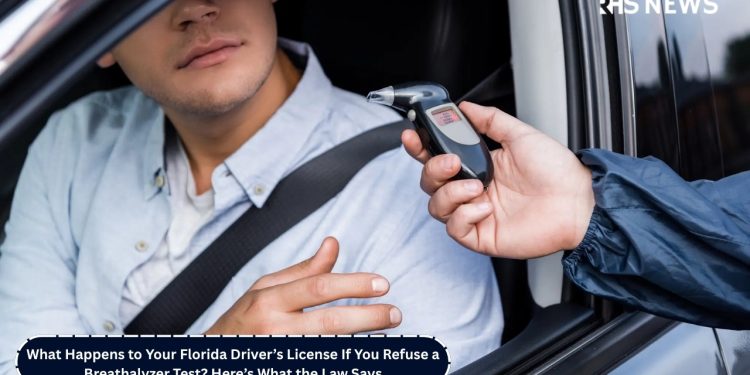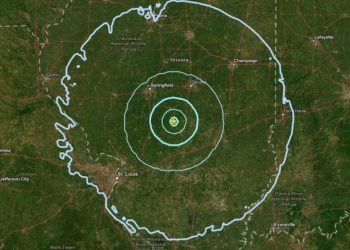Florida – Getting stopped by law enforcement under suspicion of driving under the influence (DUI) in the Sunshine State is a nerve-wracking experience. For thousands of Florida drivers every year in cities like Miami, Orlando, Tampa, and Jacksonville, one pressing question emerges in those tense roadside moments: What really happens if you refuse to take the breathalyzer test? The answer isn’t as straightforward as you might think, and the stakes can be high—both legally and practically.
Below, explore the law, recent changes, what happens the moment you refuse, the potential administrative and criminal penalties, and how this choice can impact your life in Florida for years to come.
Understanding Florida’s Implied Consent Law
Florida law is clear: driving is considered a privilege, not a right. That means when you accept a Florida driver’s license—whether in Miami’s busy Brickell streets or the coastal highways of Sarasota—you automatically agree to what’s known as “implied consent.” This law states that if a law enforcement officer has reasonable suspicion you are driving under the influence, you are expected to submit to a chemical test, such as a breathalyzer, to determine your blood alcohol content (BAC).
The Legal Foundation
The Florida Statutes state that every person who operates a motor vehicle within the state is deemed to have given consent to submit to an approved chemical or physical test for alcohol or drug influence when lawfully stopped for suspicion of DUI.
Immediate Consequences of Refusing a Breathalyzer Test
When you refuse to take a breathalyzer during a lawful DUI stop, the first and most immediate impact is on your driving privileges. Here’s what the law says, as of 2025:
First Refusal
-
Your Florida driver’s license is subject to an immediate, automatic administrative suspension for one year.
-
This suspension is enforced by the Florida Department of Highway Safety and Motor Vehicles (FLHSMV), regardless of whether you are ultimately convicted of DUI in court.
-
The officer will confiscate your physical license on the spot and typically provide a temporary permit (valid for 10 days) if you’re eligible.
Second or Subsequent Refusal
-
A second or further refusal results in an 18-month suspension of your driving privileges.
-
It also carries the additional risk of a first-degree misdemeanor criminal charge, punishable by jail time and significant fines.
These penalties apply whether you’re in bustling Orlando, vibrant Tampa, or the quieter surroundings of Ocala. Importantly, the fact that you refused a breath test will be documented and can be used as evidence in your court case, often as proof of “consciousness of guilt.”
New Changes in Florida DUI Law: Criminal Charges for Refusal
Starting October 1, 2025, Florida has adopted significant changes to its DUI laws, implementing what’s known as “Trenton’s Law.” Under this new law:
-
A first-time refusal to submit to a breath, blood, or urine test will be criminalized as a second-degree misdemeanor.
-
Penalties for your first refusal now include up to 60 days in jail, a $500 fine, and a one-year license suspension.
-
This marks a dramatic departure from the old system, where a first offense was only an administrative matter.
-
Repeat offenders continue to face an 18-month suspension, criminal misdemeanor charges, and other amplified legal penalties, including possible loss of a commercial driver’s license (CDL) for life.
This legal update reflects a push to reduce Florida’s high rate of breathalyzer refusals. Legislators hope the prospect of jail time and a criminal record—even for a first offense—will deter more people from refusing, especially in cities with high DUI incident rates such as Fort Lauderdale and Tallahassee.
How Refusal Affects Your Court Case
One misconception is that by refusing the breathalyzer, you make it harder for the state to prove DUI in court. This is true to some extent since prosecutors would have to rely on circumstantial evidence—like the officer’s testimony about your behavior, the results of field sobriety tests, or dashcam footage—instead of a hard BAC number.
However, a refusal can backfire:
-
The prosecution is allowed to argue that refusing the test demonstrates you knew you were intoxicated (“consciousness of guilt”).
-
This can be very persuasive to juries in cities like Jacksonville or Tampa.
-
Your refusal may eliminate eligibility for certain diversion programs or plea deals that could otherwise reduce your penalties.
-
Repeat refusals dramatically escalate criminal consequences and limit your legal options even more.
Refusal Rate and Florida’s Unique DUI Landscape
Florida is notorious for a comparatively high rate of breathalyzer refusals, especially in larger metro areas like Miami, Tampa, and Orlando. Over the last decade:
-
Refusal rates have approached or exceeded 35% in recent years statewide, meaning more than one out of three people pulled over for suspected DUI refuse to take the breath test.
-
In 2023, there were over 15,000 refusals recorded in Florida out of approximately 43,000 DUI citations.
-
Some prior studies once claimed rates as high as 80% in certain years, but more accurate records indicate present-day Florida refusal rates hover near 39%—still among the highest in the U.S.
-
High-refusal rates are often cited in debates over whether penalties should be made even tougher.
Additional Penalties and Far-Reaching Effects
Refusing a breathalyzer is not a simple ticket or slap on the wrist. The fallout from a refusal extends well beyond your initial traffic stop:
Administrative Hearings
Once your license is suspended, you have only 10 days to request a formal review hearing to contest the suspension. These hearings are held at DHSMV offices in every major Florida city, from Miami-Dade to Hillsborough County. If you miss this window, the suspension is confirmed by default.
Hardship License
Florida offers a hardship driver’s license for certain offenders, letting you drive to work, school, or rehab while your license is otherwise suspended. However, this is not automatic—especially for repeated refusals or if aggravating factors are present.
Insurance and Financial Impact
-
Your auto insurance premiums will likely skyrocket, and some insurers may drop you altogether.
-
The overall cost of a DUI conviction—when factoring in legal fees, fines, classes, ignition interlock devices, and increased insurance—can easily reach tens of thousands of dollars.
-
Refusal can also put commercial drivers out of work, since CDLs are suspended for at least a year on the first refusal and are permanently revoked after a second refusal.
Criminal Record and Employment
A misdemeanor conviction, even for just refusing the test, can appear on background checks, impacting future job opportunities or professional licensing, especially in cities like Fort Lauderdale and Sarasota where background checks are common for employment.
Collateral Social Consequences
-
A suspended license can make it difficult to run daily errands, pick up kids from school, or commute to work, especially in cities with limited public transit like Fort Myers or Port St. Lucie.
-
Long-term, the stigma associated with DUI-related offenses can impact relationships, community standing, and even your ability to rent or buy a home.
Are There Any Advantages to Refusing?
There are rare cases where refusal might work in someone’s favor, particularly when the prosecution’s evidence is weak and there’s a chance for reasonable doubt at trial. Without a breathalyzer result, prosecutors must piece together a case using officer observations and field tests, sometimes leading to a not-guilty verdict in cities like Pensacola or Gainesville.
However, these situations are the exception, not the rule. The new criminalization of first-time refusals makes the risk substantially greater.
Refusal in the Context of Accidents and Serious Offenses
In cases involving traffic accidents with injuries, Florida law is stricter still:
-
Officers may compel a blood draw if someone is hurt or killed in a crash, even if the driver initially refuses.
-
A warrant can be swiftly obtained to secure a blood or urine sample from the suspect, especially if transported to a hospital.
These situations typically arise after serious or fatal crashes in high-traffic regions such as Miami or Broward County.
Steps to Take If You Refuse the Breathalyzer
If you refuse a chemical test, it’s critical to act immediately to protect your legal rights:
-
Contact an experienced DUI attorney in your city—whether you live in Tampa, Orlando, West Palm Beach, or another part of Florida—right away.
-
Schedule your DHSMV hearing within 10 days of the arrest to contest your license suspension.
-
Understand that refusing the test can mean not just suspension, but actual jail time and a criminal record for even a first refusal.
-
Review your eligibility for a hardship license if you depend on driving for basic needs.
Key Facts All Florida Drivers Should Know
-
You can refuse a breathalyzer, but you cannot refuse consequences.
-
A first refusal brings at least a one-year license suspension and, from the end of 2025, also a criminal misdemeanor charge with potential jail and a fine.
-
Second and subsequent refusals are even more serious—an 18-month suspension and a first-degree misdemeanor charge. Multiple refusals may result in permanent or long-term loss of driving privileges, especially for CDL holders.
-
Refusing does not guarantee you avoid prosecution or conviction for DUI. In fact, your refusal can be used as evidence against you in court and might eliminate alternative penalties or plea options.
Conclusion: Think Before You Refuse
Refusing a breathalyzer test in Florida can set in motion a chain of legal and personal consequences that last far longer than a night behind bars or a single court date. The law was designed this way to deter impaired driving and ensure public safety on Florida’s bustling highways and city streets.
With the new law in effect after October 2025, the stakes for refusal— even if it’s your first time—are higher than ever before. If you value your right to drive, your employment opportunities, your personal reputation, and your finances, think very carefully about refusing. Better still, plan ahead: arrange for a designated driver, call a cab, or use a ride-sharing service if you plan to drink. In Florida, as in every state, the consequences of saying “no” to a breathalyzer can be severe, sobering, and long-lasting.
Helpful Links









